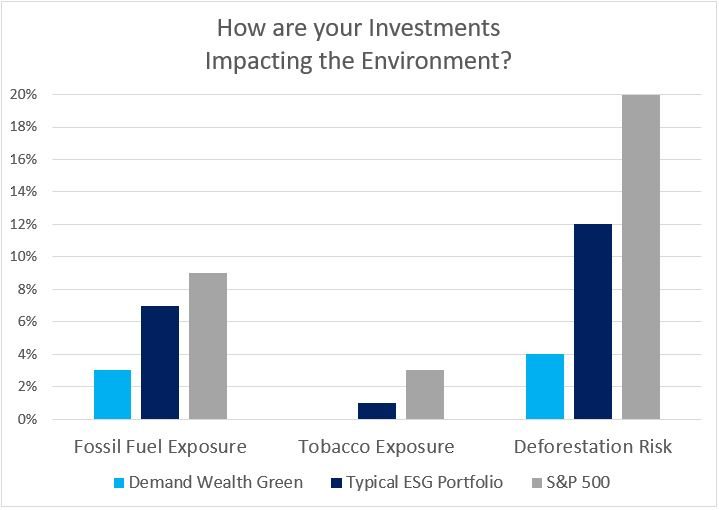The Problem
In the modern world, industrialization is one of the largest contributors of climate change. As companies seek to meet the rising demands of consumers, they are burning more fossil fuels, releasing more methane gas, and cutting down more forests. You’re probably aware of these developments and have dedicated your votes, lifestyle, and time to maintaining the health of our planet.
However, there is one area that is often overlooked as we strive to protect the environment: our investments. Corporations continue to grow while contributing to climate change because they receive continuous support: not only from their consumers, but also from their shareholders. Although more Americans are seeking to limit climate change through the cars they drive, their recycling habits, and food choices, the average investor is unknowingly supporting companies that are environmentally destructive.
If you have money in a 401k, or other investment account, it isn’t merely in a faceless account: it is going to real people supporting real time business decisions. At its core, Green investing is about evaluating each investment to ensure you are minimizing the amount of money invested in companies that are harming the environment.
Unfortunately, unless you have consciously selected your investments, there is a good chance that your portfolio is having an adverse impact on the environment. If you’re invested in the stock market (S&P 500), here is where your money is going:
• 9% of funds are going to companies that own, extract, process or burn fossil fuels1
• 3% of funds are going to companies that produce, manufacture, or promote tobacco2
• 20% of funds are going to companies contributing to deforestation3
If those numbers alarm you, you’re not alone. Due to rising environmental concerns, hundreds of investment options have developed in recent years that seek to invest in companies that are environmentally and socially responsible. However, the following quote illustrates why there is still cause for concern:
“The problem with many of these ESG options is that they are not significantly more responsible than the broader stock market (S&P500)”
– Demand Wealth founder, Brandon Mink
These broad portfolios have an “ESG” focus, which means they include companies that score highly on a range of Environmental, Social, and Governance criteria. While this helps investors ensure their money is going to more responsible companies, the wide scope can cast such a large net resulting in so-called “Environmentally Responsible” portfolios that contain big oil companies with high level fossil fuel contributions. Sadly, many of these popular “ESG” Portfolios are very similar to the stock market (S&P 500). The typical ESG portfolio includes:
• 7% of funds going to companies that own, extract, and processor burn fossil fuels1
• 1% of funds going to companies that produce, manufacture, or promote tobacco2
• 12% of funds going to companies that contribute to deforestation3
While these numbers are slightly better than those of the broad market, they aren’t as impressive as you may think or hope. That’s why it’s important to look past the labels and beneath the surface of these “ESG” portfolios to ensure your investments are genuinely committed to environmentally conscious investing.
The Solution
“At Demand Wealth, we manage our Green Portfolio in a way that truly does make a difference in the environment without necessarily sacrificing returns”
– Demand Wealth Chief Operating Officer, J. Wade Ellison
For our ‘Demand Green’ portfolio, we include solid funds that have a measurable positive environmental impact. Not only does the ‘Demand Green’ portfolio limit the fossil fuel, tobacco, and deforestation exposure, but it also invests in renewable energy and are MSCI ESG A-rated.
Minimizing Harm to the Environment

1. Data taken from fossilfreefunds.org
2. Data taken from tobaccofreefunds.org
3. Data taken from deforestationfreefunds.org
1. Fossil Fuel Exposure
The burning of these greenhouse gases produces around 21.3 billion metric tons of carbon dioxide every year. As we manage our portfolios, we limit the amount of money that goes to companies who own, extract, process, or burn fossil fuels.
2. Tobacco Exposure
Tobacco use is not only a health issue – it is an environmental issue. Cigarette butts are the most littered item in America and tobacco facilities release over 1.3 million pounds of toxic chemicals every year. That’s why Demand Wealth currently has 0% of funds invested in companies who produce tobacco, manufacture tobacco products, or promote tobacco to younger audiences.
3. Deforestation Risk
Forests are crucial to the balance of earth’s ecosystem, but they are viewed by many companies as large swaths of land that can be converted to production facilities. In 2017, the tropics alone lost approximately 61,000 square miles of forest. Our ‘Demand Green’ portfolio focuses on minimizing the amount of money invested in companies who produce agricultural commodities, finance those producers, or use processed materials in their products. Even with our goal of eliminating company stocks that contribute to deforestation, our Demand Green portfolio still has about 10% exposure. We will only see a transformation in the market once companies experience a drop in profits due to Green investors.
Investing in Renewable Energy
Our Green investing philosophy doesn’t end with screening out the “bad guys.” We take it a step further and invest a portion of all equity in stocks that are focused on the development in clean and green energy.
The two largest renewable energy holdings in our ‘Demand Green’ portfolio are Tesla, Inc. and Brookfield Renewable Partners. While Tesla is known for their luxury electric vehicles, they are also engaged in the manufacture of clean batteries and solar technology. Brookfield Renewable Partners is a renewable energy giant which owns over 200 hydroelectric plants, 100 wind farms, and 550 solar facilities. In the ‘Demand Green’ portfolio, you can rest assured knowing that a significant portion of your investments are going to companies such as these.
Overall Sustainability
A good way to measure an investment’s sustainability is its MSCI ESG rating. Morgan Stanley Capital International (MSCI) rates investments based on three criteria: their environmental impact (how the company treats the planet), social responsibility (how the company treats people), and corporate governance (how the company makes decisions). The more responsible a company is in those three areas, the higher their score will be.
Each of our green portfolios has an average “A” MSCI ESG rating,4 so you can rest assured that your positive environmental impact isn’t coming at the expense of social and governance considerations.
4. ESG rating takin from www.etf.com as a weighted average of all funds included in the portfolio. “A” rated funds have an ESG rating above 5.70.
Investment Selection
Making sure that your investments are globally diversified and properly aligned is of paramount importance at Demand Wealth. Based on the results of your risk tolerance questionnaire, the appropriate allocation from 11 models within the ‘Demand Green’ portfolio will be recommended. For example, a conservative investor will have a portfolio containing mostly bonds and light exposure to stocks, such as the ‘Demand Green’ 10/90 (10% Stocks/90% Bonds). The opposite end of the spectrum holds true for someone more aggressive, where a 70/30 or 80/20 allocation containing mostly stocks and only a few bonds is more appropriate. Low fees, solid managers, low tracking error and high sharpe ratio are also factored in.
Low Expense Ratios
Past performance of an investment does not always indicatefuture performance. There is significant uncertainty in the investment world, but through that uncertainty, there is one constant: fees. Every fund has an expense ratio: this is the fee that a manager collects for managing each fund and is expressed as a percentage of the money that you have invested. The average ETF expense ratio is around 0.44%. While this may seem negligible, if your nest egg grows to $100,000, you end up paying $440 per year.
That’s why we choose funds with lower expense ratios. On average, our ‘Demand Green’ portfolios have an expense ratio of 0.23%, so less of your money is going to managers and more of it is staying invested.
Reputable Managers
Even though past performance can’t predict future returns, fund managers can serve as a clue to a fund’s quality. We continually sort through thousands of funds and carefully select those with reputable managers.
Low Tracking Error
While Demand Wealth provides an actively managed overlay, most of the funds included in our portfolios are “Passive Funds”. Passive funds that follow an index, such as the S&P 500, generally have lower expense ratios and have historically outperformed actively managed funds. However, some passive funds track their underlying index more closely than others. The further away passive funds get from tracking the index, the more likely they are to deviate from that index. We account for this by selecting funds that historically have low tracking errors.
High Sharpe Ratio
Imagine you are deciding between two different funds: Fund A and Fund B. One has an expected return of 10%, while the other has an expected return of 7%. At first glance, Fund A would seem to be the much better option. However, if Fund A took on significantly more risk than Fund B, then Fund B could have a better risk-adjusted return. That’s why it’s so important to consider risk as well as return when looking at investment options.
The Sharpe ratio gives insight into this characteristic. An investment’s Sharpe ratio helps quantify how much return you’re getting compared to the amount of risk that you’re taking. Our portfolios are managed to contain funds that have yielded solid returns while taking on less relative risk.
Portfolio Management Strategies
Your Portfolio is continually being monitored by our team of financial professionals. We are constantly looking for opportunities to optimize your portfolio via Tax Loss Harvesting and Rebalancing strategies.
Tax Loss Harvesting
If you have a taxable account with multiple holdings, chances are there will be some down positions in any given year, even if your total portfolio is net positive. Tax loss harvesting is the process of selling investments at losses, which can provide a tax deduction (for 2020 up to a -$3000/ year loss can be written off against your annual income).
Annually we will analyze the positions in your non-retirement accounts then sell the appropriate losses and repurchase them after the 31 day wash sale rule has been satisfied. During this interim period, those funds will be invested in a placeholder similar to the sold position, so that your money stays comparably invested.
Rebalancing
Portfolio rebalancing is a staple of effective investment management. Demand Wealth sets your portfolio to an optimal allocation of stocks, bonds and real estate. This allocation will change over time as market conditions and investment performance evolve. Rebalancing is the discipline of resetting your portfolio back to its original optimal allocation. For example, if a 50% stock/50% bond portfolio evolves to be 57% stocks/43% bonds after a period of time. Rebalancing involves selling enough stocks and buying enough bonds to reset your portfolio back to its appropriate 50%/50% allocation. Of course, as your financial situation changes, Demand Wealth works to ensure that your portfolio stays properly diversified, optimized and in sync with your financial goals.
The Demand Wealth rebalancing process is performed by our skilled team. Unlike many of the robo-strategies, which only rebalance at a defined interval (e.g. +/-10%), a Demand Wealth portfolio manager rebalances when it makes optimal sense. We also incorporate macroeconomic factors which may evolve over years, rather than months, that current computing models simply aren’t able to perform.
Demand More from your investments, planningand advice. Open a ‘Demand Green’ portfolio with us today!
